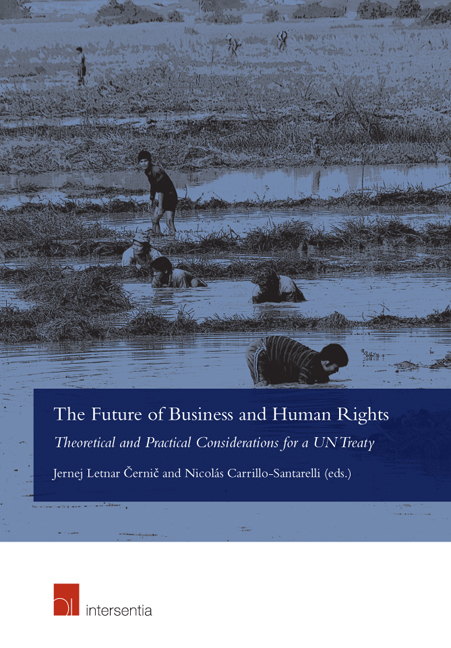Book contents
- Frontmatter
- Dedication
- Acknowledgements
- Contents
- About the Contributors
- Introduction
- Part I The Convenience and Possibility of Adopting a Treaty on Business and Human Rights
- Part II Critical Analyses Of A Treaty On Business And Human Rights
- Considering a Treaty on Corporations and Human Rights: Mostly Failures but with a Glimmer of Success
- ‘Band-Aids Don't Fix Bullet Holes ’: In Defence of a Traditional State-Centric Approach
- Voluntary vs. Binding: Civil Society's Claim for a Binding Instrument
- Part III Regional Approaches
- PART IV Lessons from other Regimes of International Law
- Conclusion
- Index
‘Band-Aids Don't Fix Bullet Holes ’: In Defence of a Traditional State-Centric Approach
from Part II - Critical Analyses Of A Treaty On Business And Human Rights
Published online by Cambridge University Press: 11 October 2018
- Frontmatter
- Dedication
- Acknowledgements
- Contents
- About the Contributors
- Introduction
- Part I The Convenience and Possibility of Adopting a Treaty on Business and Human Rights
- Part II Critical Analyses Of A Treaty On Business And Human Rights
- Considering a Treaty on Corporations and Human Rights: Mostly Failures but with a Glimmer of Success
- ‘Band-Aids Don't Fix Bullet Holes ’: In Defence of a Traditional State-Centric Approach
- Voluntary vs. Binding: Civil Society's Claim for a Binding Instrument
- Part III Regional Approaches
- PART IV Lessons from other Regimes of International Law
- Conclusion
- Index
Summary
INTRODUCTION: ‘SO IT's GONNA BE FOREVER OR IT's GONNA GO DOWN IN FLAMES’
While international obligations do, and can, exist for non-state actors, international human rights law (IHRL) has traditionally been framed through a state-centred lens, with states as duty-bearers and individuals as rights-holders. As this chapter explains, this approach requires the state to regulate the relationship between non-state actors and to ensure adequate remediation for victims whose human rights have been impacted by other non-state actors. Some scholars, including others in this volume, argue that this state-centred approach fails victims by expecting weaker states to attempt to regulate corporations that are stronger economically. While a legitimate criticism and concern, the solution may not rest in direct obligations for corporations but instead in retaining the state focus and expanding the jurisdiction states are expected to use when regulating and providing remedies against business for the protection of human rights. In its second meeting, the open-ended intergovernmental working group (IGWG) on transnational corporations and other business enterprises with respect to human rights continued to debate whether to ascribe direct human rights obligations to corporations. Focusing the treaty on direct IHRL obligations for corporations, however, may be providing a solution to the wrong problem.
In this chapter I suggest the issue that needs to be addressed is not who has the obligations but how the obligations are enforced. I further examine how current language from state-centric treaties can be modified to close the gaps in accessible and effective remedies. Readers will note that throughout the piece, I use lyrics from Taylor Swift songs to convey the specific themes of both the chapter as a whole and the particular section in which a lyric is being employed; sometimes the lyrics are explained within the section, while other times I assume the lyric's theme is self-explanatory. This is done with the hope that the lessons of the chapter are easily remembered, and the primary lesson is that of the title of this chapter: ‘Band-Aids Don't Fix Bullet Holes’, meaning that an easy solution to a complicated issue is perhaps not a solution at all. If the proposed treaty on business and human rights undermines the statecentric approach to IHRL, it may ultimately undermine the means by which victims can force accountability and obtain remedies.
- Type
- Chapter
- Information
- The Future of Business and Human RightsTheoretical and Practical Considerations for a UN Treaty, pp. 111 - 138Publisher: IntersentiaPrint publication year: 2018
- 1
- Cited by

